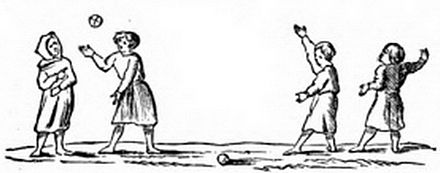narrow bands depending from the elbows, or from a little above them.
The pencil and engraver, however, can only give us a full idea of all the varied costumes of this period, which have been gleaned from illuminated works and sculptured monuments, many of which may be found well displayed in Planchés "History of British Costume."
The diversions of those ages were very much the same as those of the former one, and, therefore, need no particular description. We are surprised to hear, towards the end of the reign of Edward III., that the practice of archery was on the decline amongst the people. Every man in the feudal ages in England, who did not possess land to the value of forty shillings a year, used to be required to qualify himself for a bowman; and the practice of archery in the villages, from boyhood upward, produced those famous bowmen who cleared the fields of Creçy and Poietiers of all opponents. Could it be the introduction of gunpowder and cannon which had already produced this effect? Yet Rymer says, "That art is now neglected, and the people spend their time in throwing stones, wood, or iron; in playing at the hand-ball, football, or club-ball; in bull-baiting, and cock-fighting, and in more useless and dishonest games."

Stool-ball. Fourteenth Century. Royal MSS., 20 D. 4.
Wrestling for a ram was a favourite amusement; and a wrestling-match of this kind, between London and Westminster, in 1222, terminated in a regular battle, in which much blood was spilled.
By the "dishonest games" is probably meant such games of chance as cross and pile, to which the common people were then much addicted, and in which Edward II. spent both his time and his money; for there are found in this king's accounts items of money borrowed of his barber and the usher of his chamber while at such play. Cards were invented towards the end of the fourteenth century by Jaquemin Gringouneur, in Paris, to amuse the melancholy hours of the mentally afflicted Charles VI., but they do not appear to have been so early introduced into this country.

Card-playing, from a MS. of the Fourteenth Century, in the Imperial Library of Paris.
Tournaments, hunting, dancing, pageants, mummings, and disguisings were the amusements of the great, even the greatest princes, and were the delectation of the people when they could witness them. At a masquerade at the court of Charles VI. in Paris, in 1388, the king and five young noblemen had dressed themselves as savages, with long hair of flax fixed to their robes by pitch, which caught fire from the torches, and the king was rescued with difficulty, while four of his companions were burnt to death.
The drama appeared in that day under the form of "Mysteries and Moralities," or "Miracle-plays," which were acted in the churches and monasteries by the clergy and monks, and in which the most sacred passages and personages of the Scriptures were introduced in the most free and extraordinary manner. In these Adam and Eve appeared without the slightest aid from the draper, and yet without seeming to give any scandal; and Noah has a terrible time of it to get his wife into the ark, and when forced in, she rewards her husband with a sounding box on the ear, to the vast delight of the most aristocratic spectators. From the clergy the drama by degrees passed over to the laity. In the streets the tragetours, or jugglers, gave extensive amusement; and,

Horsemen Tilting. Twelfth Century. Royal MSS. 14 E. 3.
